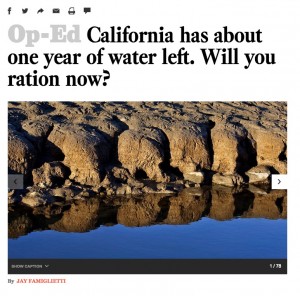Here’s a reader quiz. Which headline would be more like to draw your click?
- “California has about one year of water left.”
- “California has about one year of reservoir storage and then we must rely even more on groundwater”
The first is the headline the Los Angeles Times put atop a Jay Famiglietti op-ed last Friday. It was a scary as hell, a click-generating machine. OMG, California’s gonna run out of water! Why aren’t we talking more about this?
Kinda feel like this whole "California only has one year of water left" thing was a tad underreported today: http://t.co/KHGle2diLu
— Matt Ford (@fordm) March 14, 2015
Sunday evening, Jay seems to have grasped the misunderstanding the headline had caused. The body of the piece has a bit more nuance, noting that it’s talking about surface storage, and that this as a result placing growing pressure on groundwater, and Jay’s rightly concerned that overpumping of groundwater is a thing we ought to worry about:
Thx 4 supporting my @LATimesOpinion op-ed. Be careful: it's 'about 1 yr of reservoir storage' and then we must rely even more on groundwater
— Jay Famiglietti (@JayFamiglietti) March 16, 2015
That’s an OMG too, but the first version – “OMG, California’s about to run out!” is the one that has run amok, clickbait style, and it’s terribly misleading.
Not blaming Jay here. Many’s the time I’ve been bitten by a headline written by someone else atop my work. But it’s a reminder that communicating about water policy is hard.


California residents DO need to be scared. There are way too many lawns and swimming pools sucking up the water.
Big problem, how do you get people’s attention to motivate change without being sensationalist and oversimplified in a world where everyone operates overloaded with tasks and information?
Judy – I agree, but they need to be scared about the right things. If you scare them about “running out in a year” but that really isn’t the risk, you have a “cried wolf” problem that makes the real sacrifices needed harder to achieve.
Mike – I think you have to have policies that are robust to the reality that you describe. I’m struggling with what that looks like. Maybe I’ll write a book about it! 🙂
You get people’s attention by saying that their water bills will go up 15%, 25%, 35% (pick one) very very soon because of water shortages, and that water use limits will need to be enacted and enforced. That should generate a newspaper headline. It’s all about the money and forced lifestyle changes.
A “NASA scientist” affiliated with Cal Tech is quoted on “Democracy Now” March 16 saying that “California has one year of water left.” Not a word about storage, but he did mention the need to pump more ground water.
Shock and awe is a concept coined by the press. Plagiarised by the establishment.
Yes, I thought it was misleading.
dg
I don’t see the difference in the headlines. In one year the reservoir water will be gone. Then you have to rely on ground water.
Okay, guess what? There has never been a tally of that water. There are thousands of wells using it.
Many wells are drying up. So, how is the California economy going to continue that way?
You shut off the agriculture and the people living in Beverly Hills won’t be making movies. Marin County will have something to worry about other than yoga practice this evening.
So I see the article’s title as basically true.
The problemas at this point: water supply, no drought, it has Raines… But the rate of consumption vs rainfall is the problem… California there is one little comunity already whit NO water, and the second one is coming….
I do not remember the name but search…
California is doomed… Well wpuld you prefer 1 year plus another one of groubd water, 2 years, does it make you fell ok???
Californians prolly need more scaring. Yes, aquifer water is available, but farms in the Valley have been pumping it down at a very fast rate the last couple of years. And, as commenter Jim notes, the state probably doesn’t know how much aquifer water it has left.
It is hardly in dispute that California needs to take its water shortage more seriously. The problem here is that Mr. Famiglietti used good data in an bad sort of way by irresponsibly giving an overly alarmist tone to his op-ed.